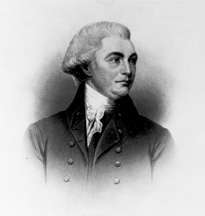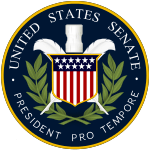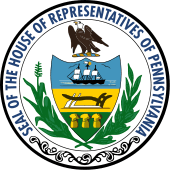William Bingham
| William Bingham | |
|---|---|
 | |
| 7th President pro tempore of the United States Senate | |
|
In office February 16, 1797 – July 6, 1797 | |
| President | John Adams |
| Preceded by | Samuel Livermore |
| Succeeded by | William Bradford |
| United States Senator from Pennsylvania | |
|
In office March 4, 1795 – March 4, 1801 | |
| Preceded by | Robert Morris |
| Succeeded by | Peter Muhlenberg |
| 1st Speaker of the Pennsylvania House of Representatives | |
|
In office December 6, 1791 – April 10, 1792 | |
| Preceded by | Himself (as Speaker of the Assembly) |
| Succeeded by | Gerardus Wynkoop II |
| Member of the Pennsylvania House of Representatives | |
|
In office 1793–1794 | |
| Personal details | |
| Born |
April 8, 1752 Philadelphia, Pennsylvania |
| Died |
February 6, 1804 (aged 51) Bath, England |
| Resting place | New York City, New York, U.S. |
| Nationality | American |
| Political party | Federalist |
| Spouse(s) | Ann Willing |
| Children |
Maria Matilda Anne Louisa William |
| Alma mater | University of Pennsylvania |
| Profession | Banker |
William Bingham (March 8, 1752 – February 6, 1804) was an American statesman from Philadelphia. He was a delegate for Pennsylvania to the Continental Congress from 1786 to 1788 and served in the United States Senate from 1795 to 1801.[1]
Early life
William Bingham was born on 8 March 1752 in Philadelphia.[2][3] He graduated from the College of Philadelphia (now the University of Pennsylvania) in 1768.
Philadelphia Society
Bingham first travelled to Europe in 1773, and upon returning to America joined the Philadelphia Society. Sent by the Committee of Secret Correspondence to Martinico, to reside ostensibly as a merchant, and establish communications through that colony with Silas Deane,[4] the committee's agent in France. He departed America aboard the frigate Reprisal on July 3, 1776. During his voyages, he established links with French merchants at Martinique, captured several British ships, and returned in 1777 to America with several full loads of munitions, guns, and other vital goods necessary for the fighting of a war.[5]
Business Interests
By the end of the American Revolution, Bingham was regarded as one of the richest men in Pennsylvania, having made his fortune through joint ownership of privateers and trading.[1] He became a major land developer, purchasing lands in upstate New York and 2 million acres (8,000 km²) in Maine, later known as the Bingham Purchase.[6] With his son-in-law Alexander Baring, he helped broker the Louisiana Purchase.[7]
Bingham was director of several other enterprises. He maintained shipping ventures after the Revolutionary war, through his mercantile house called "Bingham, Inglis, and Gilmore". He was a leading member of the Pennsylvania Society for the Encouragement of Manufactures and Useful Arts, donating a Philadelphia property to be converted into a textile factory.[8]
Mounted General
During the 1780s, Bingham marshaled the Second Troop of Philadelphia Light Horse, an outfit of 50 dragoons. They were glamourously clad and saw little action. William Jackson was first major and later became Bingham's land agent. Bingham escorted President-elect George Washington through Pennsylvania with his troop on his April 1789 journey from Valley Forge to New York City to assume the presidency.[9]
Politics

During the provisional government of the United States at Philadelphia, he wrote the by-laws for the national Bank of North America. He saw the national debt as beneficial in that it attracted interest into the affairs of the government. During the first presidency, Treasurer Alexander Hamilton sought Bingham as his mentor in managing taxes, tariffs, and in constructing a national bank.[10]
Speaker of Pennsylvania House
In America, he represented Pennsylvania as a delegate to the Continental Congress from 1786 to 1788. In 1790 and 1791 he was elected to the Pennsylvania House of Representatives, serving as its first speaker in 1791. He oversaw development of the land during a fledgling period of America as a member of the Society of Roads and Inland Navigation, where he worked closely with Albert Gallatin of western Pennsylvania.[11] He later served in the Pennsylvania State Senate from 1793 through 1794.[12] He built roads and a bridge from Philadelphia to Lancaster, Pennsylvania called the Lancaster Pike.
American Senator
By 1795, he was elected to the United States Senate where he served as a Federalist and Nationalist while it was originally at Philadelphia, but he left for England in 1801 when his wife had taken ill. He was an active supporter of John Adams and when Adams was elected President, Bingham served as the Senate's President pro tem in the Fourth Congress. On March 4, 1797, with the start of the Fifth Congress he administered the oath of office to Vice President Thomas Jefferson.[13] He was criticized by Jeffersonian politicians for "extravagance, ostentation and dissipation".[1] In 1813, nearly ten years after his death, John Quincy Adams said that the Presidency, the Capital and the Country had been governed by Bingham and his family connections.[1]
The several Bingham estates were renowned for hosting many prominent aristocrats from Europe as well as Federalist meetings. At the Bingham estate, Federalists agreed to hold preliminary votings before propositions were brought before Congress publicly, thus creating unanimity among party lines.[14]
Binghamton
He was also a land surveyor, and looked to develop areas currently a part of Southern New York, and Northern Pennsylvania. One of his prime prospects was at the confluence of the Chenango River and Susquehanna River. Judge Joshua Whitney Jr., settler and Bingham's agent, called this town Binghamton to honor him. Furthermore, Binghamton's resident university Binghamton University recognizes Bingham through the naming of Bingham Hall.
Family
He married Anne Willing, daughter of Thomas Willing, President of the First Bank of the United States, and they had two daughters and a son.
- Ann Louisa Bingham.[15] In 1798, she married Alexander Baring, 1st Baron Ashburton. They were the parents of nine children.
- Maria Matilda Bingham (1783-1849). At the age of 15, she was briefly married to a French aristocrat, Jacques Alexandre, Comte de Tilly. Afterwards she married her sister's brother-in-law, Henry Baring. They were the parents of five children. Maria and Henry were divorced in 1824; she married the Marquis de Blaisel in 1826.[16]
- William Bingham (1800-1852). In 1822, he married Marie-Charlotte Chartier de Lotbiniere (1805-1866), Seigneuresse de Rigaud. She was the second of the three daughters and heiresses of Michel-Eustache-Gaspard-Alain Chartier de Lotbinière, by his second wife Mary, daughter of Captain John Munro. They lived in Montreal, Paris and London; and were the parents of six children. Bingham settle in England and died in Kent in 1852.
Although his wife and two daughters factored prominently in the social affairs of American politics, Bingham's wife Ann died while his only son William was one year old. William Sr. left William Jr. to grow up in America with his grandfather Thomas Willing.
Bingham died on February 6, 1804 in Bath,[17] England and is interred in Bath Abbey. His estate remain in the family until the death of William Alexander Baring Bingham (1858-1915) but it was not settled until 1964.[18]
See also
- Speaker of the Pennsylvania House of Representatives
- List of wealthiest historical figures
- List of richest Americans in history
References
- 1 2 3 4 Maine League of Historical Societies and Museums (1970). Doris A. Isaacson, ed. Maine: A Guide 'Down East'. Rockland, Me: Courier-Gazette, Inc. pp. 381–382.
- ↑ G. E. Cokayne, with Vicary Gibbs, H.A. Doubleday, Geoffrey H. White, Duncan Warrand and Lord Howard de Walden, editors. The Complete Peerage of England, Scotland, Ireland, Great Britain and the United Kingdom, Extant, Extinct or Dormant, new ed., 13 volumes in 14 (1910-1959; reprint in 6 volumes, Gloucester, U.K.: Alan Sutton Publishing, 2000), volume I, page 277.
- ↑ Record for William Bingham on thepeerage.com
- ↑ The Committee of Secret Correspondence to Silas Deane, July 8, 1776, franklinpapers.org
- ↑ Hinman, Marjory Barnum, Bingham's Land, Whitney's Town. p.14 (1996) Broome County Historical Society.
- ↑ http://newenglandtowns.org/maine/franklin-county "Franklin County, Maine", New England Towns. Retrieved: 11-22-2007
- ↑ Hinman, Marjory Barnum (1996). Pages 17-21, Bingham's Land, Whitney's Town. Broome County Historical Society.
- ↑ Alberts, page 222.
- ↑ Alberts, page 166.
- ↑ Alberts, page 195.
- ↑ Alberts, page 239.
- ↑ Cox, Harold. "Senate Members B". Wilkes University Election Statistics Project. Wilkes University.
- ↑ The proceedings of the Senate at a session specially called on March 4, 1797, Journal of the Senate of the United States of America, 1789-1873
- ↑ Alberts, page 337.
- ↑ "Lady Ashburton". Maine Memory Network.
- ↑ "The Peerage, page 1308". August 5, 2015.
- ↑ Alberts, page 427.
- ↑ Associated Press. "Heirs of 1804 Trust to Divide $840,000." New York Times. November 15, 1964. Page One.
Further reading
- Robert C. Alberts, The Golden Voyage: The Life and Times of William Bingham, 1969, Houghton Mifflin.
External links
Archival Collections
- Guide to the Land Grant to William Bingham, Esq., for Property in Lycoming County from Thomas Mifflin, Governor of Pennsylvania. Special Collections and Archives, The UC Irvine Libraries, Irvine, California.
Other
- United States Congress. "William Bingham (id: B000474)". Biographical Directory of the United States Congress.
- Biography at Virtualology.com
- Biography and portrait at the University of Pennsylvania
- The William Bingham Correspondence , including letters from 1791 to 1803, are available for research use at the Historical Society of Pennsylvania.
- The Political Graveyard
| United States Senate | ||
|---|---|---|
| Preceded by Robert Morris |
U.S. Senator (Class 3) from Pennsylvania 1795–1801 Served alongside: James Ross |
Succeeded by John Peter G. Muhlenberg |
| Political offices | ||
| Preceded by Samuel Livermore |
President pro tempore of the United States Senate 1797 |
Succeeded by William Bradford |
| Preceded by Office Created |
Speaker of the Pennsylvania House of Representatives 1791–1792 |
Succeeded by Gerardus Wynkoop II |


